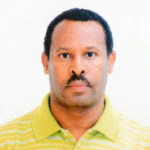What is the most useful training for missionaries?
By Solomon Akalu
Up until the end of the 20th century, the Ethiopian Kale Heywet Church (EKHC) did not have a school where its cross-cultural ministers could receive training or specialize in missions. The majority of cross-cultural missionaries were graduates of Bible schools and sent out with no or minimal training in missions.
Hence, many lacked the appropriate communication strategy to share the Good News in different cultures. This also contributed to slow church growth in some parts of the country. Thus, the EKHC founded the Ethiopian Kale Heywet School of Missions (EKSM) in May 2001.

Pastor Teferi Bezabih testifies that because of the fervent prayers and contextualized evangelism of the Hub School graduates, the churches are doubled in number in one region.
Initially, EKSM intended to bring all untrained cross-cultural evangelists to its centre in Durame town for training. But this proved impossible due to the huge finances and logistics needed to bring together 1200 evangelists at once. Further, removing all missionaries from their fields could be detrimental to the new churches. All these reasons provoked a question: What is the most effective, relevant, and accessible strategy to train missionaries?
After discussion and prayer with EKHC leaders, EKSM proposed to set up eight “Missions Hub Schools” at selected strategic sites. These were established by 2010.
The purpose of EKSM’s Hub Schools is to take the training to the mission field, right where the cross-cultural evangelists work.
Research and experience show that cross-cultural workers are more effective when trained in the field and classroom together. Evangelists come to the training centres for one month and return to their fields for one month (six times in a year). The programme takes one year, and successful trainees earn a diploma or certificate in missions, depending on the grade level they attain.
To be effective and successful in the mission field, missionaries must be trained in the three-fold philosophy of education: know, be, and do. This approach is designed into the curriculum to be implemented informally, non-formally, and formally.
Thus, EKSM Hub Schools aim to equip students theologically, missiologically and practically to serve in different cultural contexts by focusing on the three-fold philosophy.
1) Know (Head)
Some courses develop theoretical foundations and establish a biblical framework for missions. These are not merely theoretical. They help students better understand the Word of God for their own lives and apply it to others’ way of life using different but appropriate communication methods. What is taught in the classroom must be field tested.
2) Be (Heart)
All knowledge gained needs to be applied in the lives of the trainees. The programme’s objective is to produce mature and committed cross-cultural missionaries growing in the image of Jesus Christ. To achieve this, the centres’ curriculum also includes courses that nurture character and attitudinal transformation. Module courses deal with spiritual formation, daily planned spiritual discipline activities, and interaction with the community around the training centre.
We also provide opportunities for students to develop their spiritual lives and character. The students and staff fast regularly in groups and as a whole school body. There are early morning group prayers and evening devotions. Intercession, hearing God, mentoring and chapel for the whole school take place from Tuesday to Friday morning. All these activities help the students to mature and develop spiritually.
3) Do (Hands)
The knowledge gained in the classroom and anticipated character development become more effective when supported with practical courses. These courses enable the trainee to gain creative problem-solving principles and methods that help to support themselves, alleviate poverty in the community they serve and expand the Kingdom of God.
Other activities help the students to enhance their character into Christlikeness. Students clean the schools. Twice weekly, they work in agricultural fields. They also take turns to serve in the dining room.
Every student should be involved at least in one of the school’s 12 committees, where they can exercise leadership skills.
The informal and non-formal training helps the trainee to practice immediately what is learned in the classroom. They don’t have to wait two or more years until they graduate. They bring questions or challenges they faced for discussion as they practice the theory they learned when they return to the class. This on-the-job training is very practical, effective, and relevant.
Who is the Ethiopian Kale Heywet Church?
The EKHC is a large evangelical denomination of about 10,000 churches and 10 million members. Founded in 1927, its mission force today is about 1500 missionaries across Ethiopia, Africa and the world. www.ekhc.org

Solomon Akalu is the Global Missions Coordinator for the Ethiopian Kale Heywet Church (EKHC). Email him at solomonserves@gmail.com.
